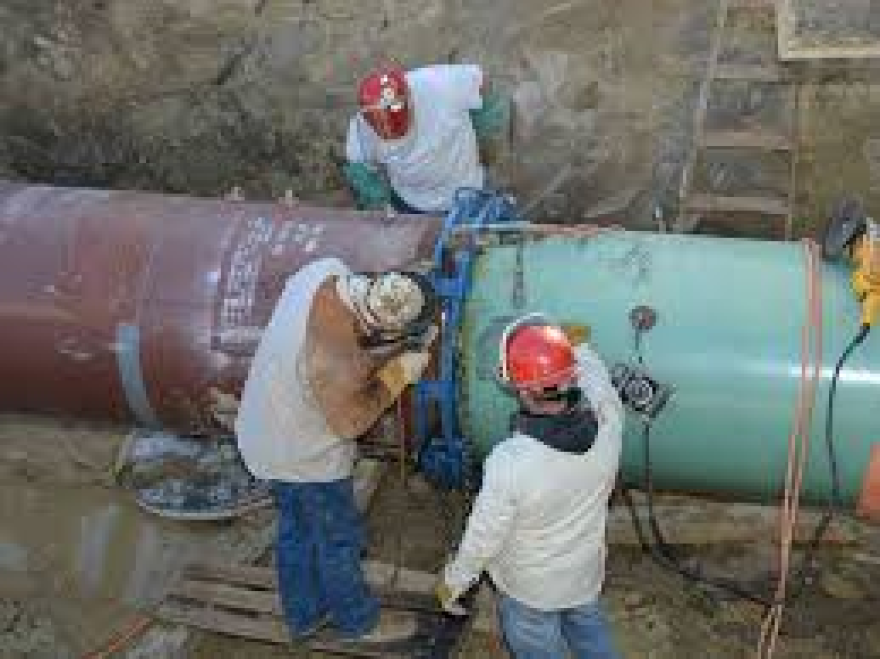Those who follow the movement against the Keystone XL pipeline may remember a time in 2012, when protesters began acts of civil disobedience in East Texas aimed at stopping the pipeline during construction. They chained themselves to trucks and organized a “tree sit,” putting themselves directly in the path of vehicles and machinery that were clearing forest for the pipeline, according to State Impact.
Filmmaker John Fiege followed that group and premieres his movie “Above All Else” at this year’s SXSW Film Festival in Austin. Fiege makes no secret of his opposition to the pipeline, but the movie is more than a political statement. He says he wanted to chronicle the moment in time when the American environmental movement became more galvanized than it had been in decades.
Fiege sat down with StateImpact Texas to talk about the current state of environmentalism in the country, what protesters hoped to accomplish through “tree sitting,” and what the future may hold if the pipeline is ultimately approved by the Obama administration.
The Context
“The context, I think, is the failure of the cap and trade legislation in 2009. The environmental movement put all of its energy into passing legislation intended to address climate change, and it failed early in President Obama’s administration. Then the environmental movement turned to the Keystone XL pipeline issue, and they went back out into the streets and demanded change. And we haven’t seen that kind of mass movement develop since the 1970s.”
On the Logic Behind Efforts to Stop or Slow Pipeline Construction
“One of the points the environmental movement has been making all along is that tar sands are right on the edge of being economically viable to turn into oil. And only because of the inflated gas prices that we’ve been experiencing since all of this turmoil in the Middle East, that’s been going on since the Iraq war. So if oil prices were to drop, suddenly tar sands production would shut down. So the flip side of that is, if you can make it too expensive to get tar sands to market, it will shut itself down.
That’s been one of the key strategies of the environmental movement. So, the oil industry says, ‘Oh, we’ll just ship it by rail. We’ll just ship it over the Rockies through First Nations lands.’ But those things are harder and more expensive and will really cut down on the margin that’s required for the tar sands to be a viable source of oil.”
How Keystone Protests Were Different
“That was one of the first things that caught my attention. The environmental movement has always had its strongest presence in urban coastal areas among upper middle class folks. The movement has struggled to branch beyond that. And the Keystone XL pipeline fight made enormous progress in connecting with people in the middle of the country. Ranchers, farmers, everyday folks.”
On the Failure of Civil Disobedience in Texas
“The short of it is, even though the southern leg of the pipeline was built and tar sands oil is now flowing from Alberta down to the Texas Gulf Coast, its not going at the rate that TransCanada and other companies were going for. President Obama still has not approved the northern leg of the pipeline, to the surprise of everyone involved. The State Department was on track to approve this a couple years ago. I think the environmental movement, even though they’ve lost part of this battle, they’ve been very successful in having an impact on this project in a very tangible way. And to really raise the profile of the climate change conversation in the media as a result of it.”
What Happens if President Obama Approves the Pipeline
“I think if President Obama approves the northern leg of the pipeline, then the environmental movement will grow even bigger and even stronger, because people are very passionate about this issue. The science is unbelievably clear how important it is that we reduce our carbon pollution into the atmosphere. And the other thing that this fight has revealed is how unbelievably inter-twined money and politics are. How much power and influence the oil industry has. I think the environmental movement, while fighting its traditional battle about conservation and climate change, is really going to start to focus on removing money from politics.”
John Fiege is the director of Above All Else. That film premieres as part of this year’s SXSW Film Festival. This interview have been edited for clarity and brevity.


